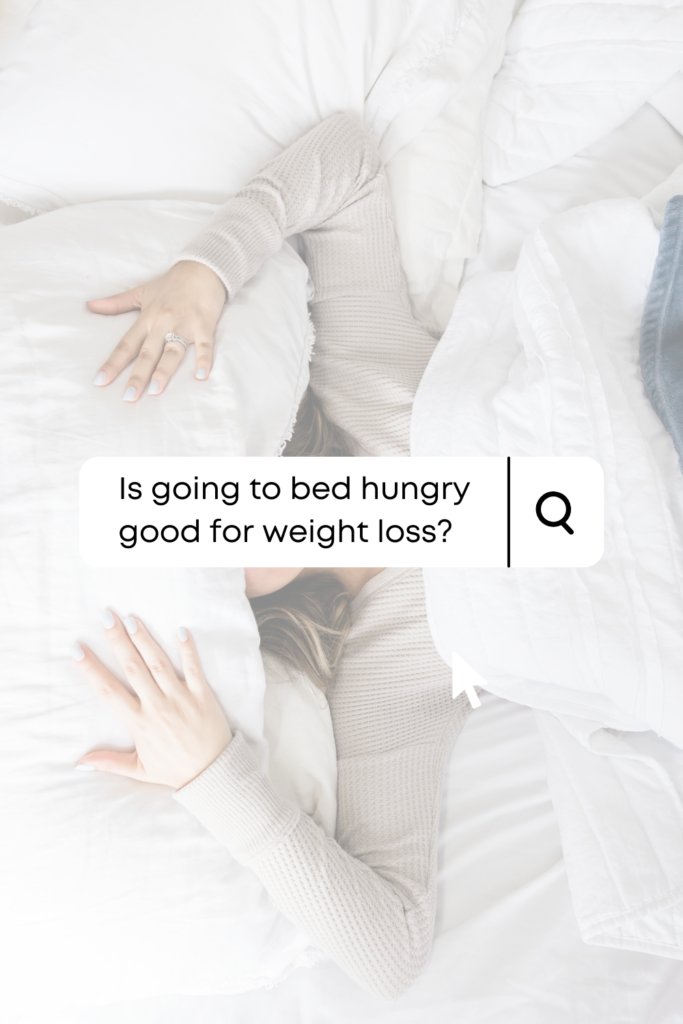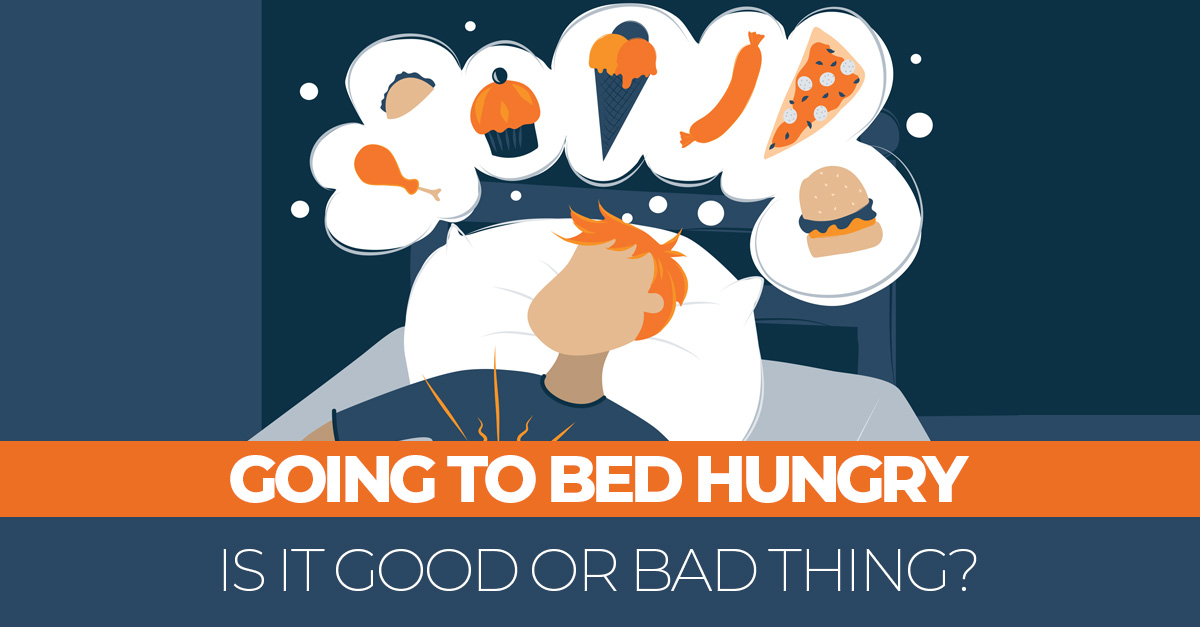No, going to bed hungry is not necessarily good for weight loss. It can lead to poor sleep and overeating the next day.
In the quest for weight loss, many wonder if it’s wise to go to bed hungry. Some believe it helps shed pounds faster. Others think it disrupts sleep and metabolism. Balancing hunger and weight loss can be tricky. Understanding how the body reacts to hunger at night is crucial.
This blog explores the effects of bedtime hunger on weight loss. We’ll delve into sleep quality, metabolic changes, and eating habits. By the end, you’ll know if skipping that late-night snack is beneficial. Stay with us to uncover the truth about going to bed hungry for weight loss.

Credit: missnutritiouseats.com
Introduction To Bedtime Hunger
Many people think going to bed hungry helps with weight loss. They believe eating late at night causes weight gain. This idea is common. Some think the body burns fat better when hungry. Others say it helps control late-night snacking.
This article will explore if bedtime hunger helps lose weight. We will look at different views. We will also see what experts say. By the end, you will know more about this topic. It will help you make better choices.
Understanding Hunger Signals
Physical hunger grows slowly. You may feel a rumbling stomach. This type of hunger is real. It tells you that your body needs fuel. Emotional hunger hits fast. It often comes with cravings. You might want sweets or snacks. It does not mean your body needs food. It’s often a reaction to stress or boredom.
Going to bed hungry can make it hard to sleep. Your stomach might growl. You may feel restless. This can lead to poor sleep. Poor sleep affects weight loss. You may feel tired the next day. This can lead to more eating. It’s a cycle that can be hard to break. Eating a small snack before bed might help. Choose something light and healthy.
Metabolism And Nighttime Eating
Eating late at night can slow down your metabolism. A slow metabolism burns fewer calories. This makes it harder to lose weight. Going to bed hungry might speed up your metabolism. Your body works to keep itself warm. This burns more calories.
While you sleep, your body still burns calories. It uses energy to repair muscles and organs. Going to bed hungry may help burn a few more calories. But being too hungry can disrupt sleep. Poor sleep can lead to weight gain. Balance is important.

Credit: missnutritiouseats.com
Pros Of Going To Bed Hungry
Feeling hungry before bed might help with weight loss. Eating late at night can add extra calories. Reducing late-night snacks can lower your daily calorie intake. This can help you lose weight over time. Hunger before bed might signal that your body is using stored fat. This can help you burn more calories while you sleep.
Going to bed on an empty stomach can aid digestion. It allows your body to rest and heal. Eating late can cause issues like acid reflux. A lighter stomach before bed can prevent these problems. It can also lead to better sleep. Better sleep promotes overall health and helps with weight control.
Cons Of Bedtime Hunger
Going to bed hungry can disrupt your sleep. A growling stomach can keep you awake. This can lead to poor sleep quality. Lack of sleep affects your mood and energy. It can also make you more hungry the next day. Poor sleep can affect your weight loss goals. Sleep is very important for health.
Skipping meals can lead to nutrient deficiencies. Your body needs vitamins and minerals. Without them, you can feel weak and tired. This can affect your health in many ways. It’s important to eat balanced meals. Ensure you get all the nutrients you need.
Healthy Bedtime Snacks
Choose snacks that are rich in nutrients. For example, a small apple with almond butter. A handful of nuts is also good. Greek yogurt with honey is tasty. Try a banana with peanut butter. These snacks provide essential vitamins and minerals. They help you feel full. They are also low in calories. This makes them perfect for bedtime.
Always keep your snacks small. Use a small bowl. Avoid eating from a big bag. Measure your snacks before eating. This helps you avoid overeating. Put away extra food. Eat mindfully and slowly. Enjoy each bite. This helps you feel satisfied. Drink water with your snack. It helps you feel full. Avoid high-calorie foods. Stick to healthy choices.
Expert Opinions
Dietitians say going to bed hungry can be tricky. It might help weight loss if it stops late-night snacking. Skipping meals is not a good idea. It can slow down your metabolism. You might feel tired the next day. Balance is important. Eat a healthy dinner a few hours before bed. This keeps you full but not too full. Listen to your body. Eat if you are truly hungry. Choose a light snack like yogurt or fruit. This can help you sleep better and stay healthy.
Studies show mixed results. Some say going to bed hungry helps weight loss. Others say it can lead to overeating the next day. Your body needs fuel to sleep well. Poor sleep can affect weight loss. It can make you eat more calories. Consistent meal times may help. Eat smaller meals throughout the day. This keeps hunger in check. More research is needed to know for sure. It is best to follow a healthy eating plan. Consult with a healthcare professional for advice.

Credit: www.sleepadvisor.org
Frequently Asked Questions
Is It Safe To Go To Bed Hungry?
Going to bed hungry is generally safe if you maintain a balanced diet. It can help with weight loss by reducing late-night snacking. Ensure you are not skipping meals during the day.
Can Going To Bed Hungry Help With Weight Loss?
Yes, going to bed hungry can help with weight loss. It reduces nighttime calorie intake and encourages the body to use stored fat for energy.
What Are The Benefits Of Sleeping On An Empty Stomach?
Sleeping on an empty stomach can improve digestion, aid in weight loss, and promote better sleep quality. It prevents late-night overeating.
Does Being Hungry At Night Affect Sleep Quality?
Yes, being slightly hungry at night can improve sleep quality. However, extreme hunger can disrupt sleep and cause discomfort.
Conclusion
Choosing to go to bed hungry for weight loss isn’t wise. It can lead to poor sleep and increased cravings. Instead, focus on healthy, balanced meals. Ensure portion control and mindful eating. Small, nutritious snacks can help curb hunger. Listen to your body’s needs.
Prioritize overall health over quick fixes. Sustainable habits lead to long-term success. Weight loss should be gradual and healthy. Always consult a doctor or nutritionist for personalized advice. Make informed choices for a healthier, happier you.


